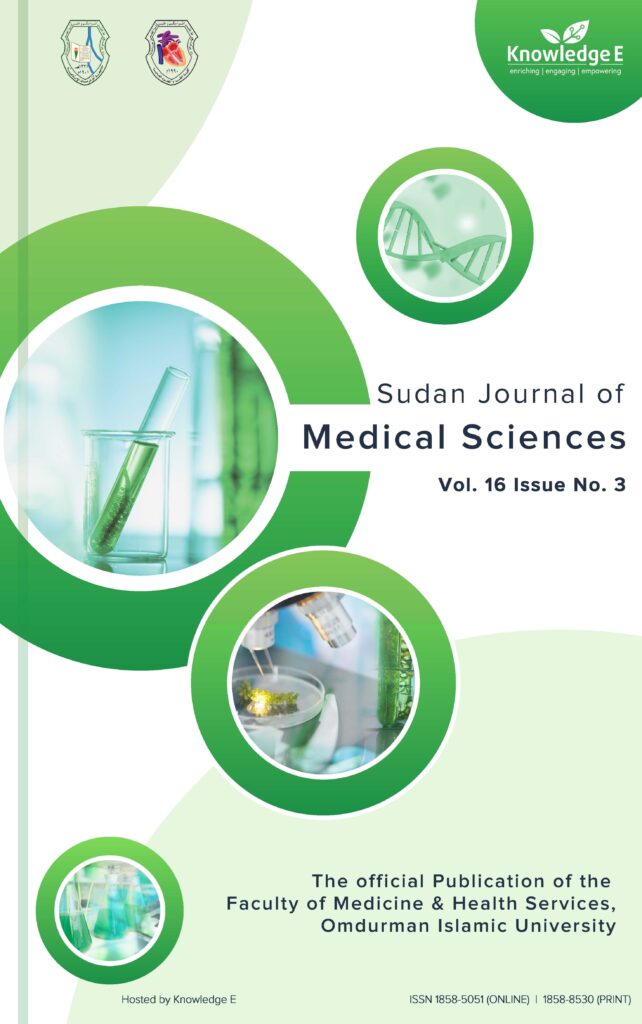
Sudan Journal of Medical Sciences
ISSN: 1858-5051
High-impact research on the latest developments in medicine and healthcare across MENA and Africa
Undergraduate medical research perspective among medical students in university of Khartoum: a cross-sectional study from Sudan
Published date:Sep 30 2020
Journal Title: Sudan Journal of Medical Sciences
Issue title: Sudan JMS: Volume 15 (2020), Issue No. 3
Pages:237 - 248
Authors:
Abstract:
Background: Research is one of the crucial factors in the advancement of health. Undergraduate medical research training is a cornerstone in medical students’ education. This study aimed to evaluate the knowledge and attitude of medical students toward medical research.
Methods: This cross-sectional analytical study included 200 medical students in their fifth and sixth years at the Faculty of Medicine, University of Khartoum. Data was collected using a self-administered questionnaire, assessing students’ knowledge and attitudes toward medical research, which were scored out of 100. Data were analyzed using the SPSS software.
Results: Of the 200 students, 69% were females and 31% males; 81% of them held a Sudanese secondary school diploma and reported future clinical career choice. Their mean academic score was 16 out of 32 6.6 points. Students’ mean knowledge score was 36 out of 100, which was considered low. Their mean attitude score toward medical research was 48.2 out of 100, which was considered moderate.
Conclusions: This study concluded that the knowledge of fifth- and sixth-year medical students about medical research was low. However, moderately positive attitude was reported among them. It is recommended that students’ engagement in active research ought to be started early in their medical school. Additionally, more engaging and interactive methods of teaching research are endorsed to be implemented.
Keywords: attitude; knowledge; medical research; medical students; University of Khartoum
References:
1. PAHO/WHO. WHO strategy on research for Health. Geneva World Heal Organ [Internet]. 2014 Dec 1; Available from: https://www.who.int/phi/WHO_Strategy_on_research_for_health.pdf
2. Lavis JN. Research, public policymaking, and knowledge‐translation processes: Canadian efforts to build bridges. J Contin Educ Health Prof. 2006;26(1):37–45.
3. AlGhamdi KM, Moussa NA, AlEssa DS, AlOthimeen N, Al-Saud AS. Perceptions, attitudes and practices toward research among senior medical students. Saudi Pharm J. 2014;22(2):113–7.
4. Segal S, Lloyd T, Houts PS, Stillman PL, Jungas RL. The association between students’ research involvement in medical school and their postgraduate medical activities. Acad Med J Assoc Am Med Coll. 1990;65(8):530–3.
5. Reinders JJ, Kropmans TJB, Cohen-Schotanus J. Extracurricular research experience of medical students and their scientific output after graduation. Med Educ. 2005;39(2):237.
6. Hren D, Lukić IK, Marušić A, Vodopivec I, Vujaklija A, Hrabak M, et al. Teaching research methodology in medical schools: students’ attitudes towards and knowledge about science. Med Educ. 2004;38(1):81–6.
7. Houlden RL, Raja JB, Collier CP, Clark AF, Waugh JM. Medical students’ perceptions of an undergraduate research elective. Med Teach. 2004;26(7):659–61.
8. Frishman WH. Student research projects and theses: should they be a requirement for medical school graduation? Heart Dis. 2001;3(3):140–4.
9. Sackett DL, Rosenberg WMC, Gray JAM, Haynes RB, Richardson WS. Evidence based medicine: what it is and what it isn’t. British Medical Journal Publishing Group; 1996.
10. Kazdin AE. Evidence-based treatment and practice: new opportunities to bridge clinical research and practice, enhance the knowledge base, and improve patient care. Am Psychol. 2008;63(3):146.
11. Vujaklija A, Hren D, Sambunjak D, Vodopivec I, Ivaniš A, Marušić A, et al. Can teaching research methodology influence students’ attitude toward science? Cohort study and nonrandomized trial in a single medical school. J Investig Med. 2010;58(2):282–6.
12. Siemens DR, Punnen S, Wong J, Kanji N. A survey on the attitudes towards research in medical school. BMC Med Educ. 2010;10(1):4.
13. Khan H, Khawaja MR. Impact of a workshop on the knowledge and attitudes of medical students regarding health research. J Coll Physicians Surg JCPSP. 2007;17(1):59.
14. Chaturvedi S, Aggarwal OP. Training interns in population‐based research: learners’ feedback from 13 consecutive batches from a medical school in India. Med Educ. 2001;35(6):585–9.
15. Fahal AH. Medical education in the Sudan: its strengths and weaknesses. Med Teach. 2007;29(9–10):910–4.
16. Khan H, Khawaja MR, Waheed A, Rauf MA, Fatmi Z. Knowledge and attitudes about health research amongst a group of Pakistani medical students. BMC Med Educ. 2006;6(1):54.
17. Association GA of the WM. World Medical Association Declaration of Helsinki: ethical principles for medical research involving human subjects. J Am Coll Dent. 2014;81(3):14.
18. Vodopivec I, Vujaklija A, Hrabak M, Lukic IK, Marusic A, Marusic M. Knowledge about and attitude towards science of first year medical students. Croat Med J. 2002;43(1):58–62.
19. Elsheikh MN, Khalil R, Diab A, Abdalnabi R, Muneer M, Elhassan A, et al. Tutors, The Valuable Resource to Enhance Medical Students’ Motivation. Sudan J Med Sci. 2018;13(3):196.
20. Cursiefen C, Altunbas A. Contribution of medical student research to the MedlineTM‐indexed publications of a German medical faculty. Med Educ. 1998;32(4):439–40.